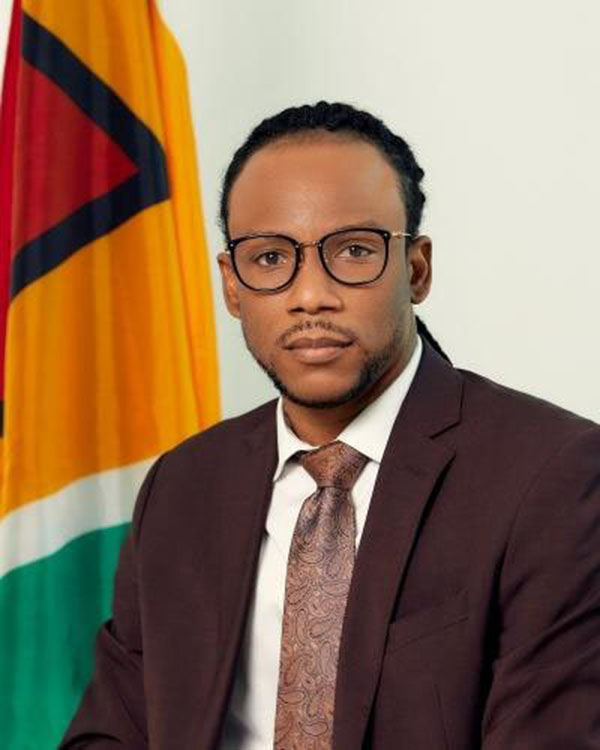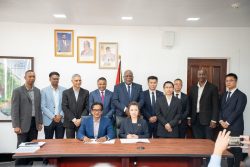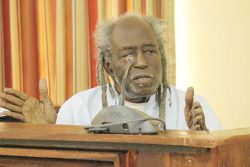The Chair of the Public Accounts Committee (PAC) of Parliament says that the failure of the government to undertake an audit of US$9.5b in ExxonMobil’s expenditure is a glaring example of its real position on transparency, accountability and good governance.
In a comment to Stabroek News on the revelation made last week by Vice President Bharrat Jagdeo, the Chair of the PAC, Jermaine Figueira said yesterday: “All the talks the now government had pre 2020 about ExxonMobil and their promise to change the contract, was just that, talks. Nothing they promised to do to ExxonMobil and that contract was done and quite frankly, the government’s attitude to this new form of economic colonialism (is that) nothing will be done”.
Figueira, a Member of Parliament for APNU+AFC, said that Jagdeo’s disclosure at a press conference last week was more of a “mixture of an academic and political response to evade the failure of the government to make right the combined failure of both administrations (APNU+AFC and PPP/C) for the benefit of the Guyanese people”.
The PAC Chair said that the government is squandering yet another opportunity to right a wrong.
“Can you imagine Jagdeo having the same energy on that then non- issue of the signing bonus of US$18m the APNU+AFC coalition had received?
“The fact of the matter is, there has been a combined failure of both administrations to conduct those very important audits of those oil companies and yet again the failure continues”, Figueira said.
He added that the Vice President’s “cavalier attitude” in his response should be concerning to every right-thinking Guyanese, especially those who have an appreciation for what a ten or twenty percent of US$9.5 billion dollars could do for the country and its people”.
Equally, Figueira said that the people should be demanding that an audit be done and be made public.
“Is this not what the champions of democracy, the defenders of transparency, accountability and good governance fought for? Isn’t this a matter worth having a collective fight of all Guyanese for the benefit of all Guyana?” Figueira questioned.
Jagdeo last week announced that Exxon-Mobil’s post-2017 expenditure for the Liza-1 and Liza-2 wells would not be audited as government was not able to select a strong local group to undertake it, although it had advertised this year for foreign firms.
“We have been very disappointed that we have not been able to select a group to do the audit of the post-2017 expenditure on Exxon. The reason is we did not have a strong local content. We had two local groups that came in but they were not strong enough. We want to build a capacity in Guyana to do this audit,” Jagdeo said.
“We think our people have enormous skills, forensic skills, auditing skills, and we are looking to see if we can’t have an arrangement where we have a consortium of local people partnering with a foreign company so we can build capacity right here in Guyana. We are disappointed that from the individual bids we did we have not been able to do this. When I get back from Scotland (from the COP26 conference) I have asked the minister to see if we can’t get all the groups that expressed interest to see how we can partner, they can partner with a foreign company to do this audit. We also have to build this capacity in GRA (Guyana Revenue Authority). GRA has been mandated to build a capacity to do this. But it is a disappointment because it has been quite a while,” he added.
Jagdeo’s announcement has been met with a torrent of criticism and since then the government has maintained silence. There has been no reaction from President Irfaan Ali or the Minister of Natural Resources, Vickram Bharrat.
Prior to Jagdeo’s casual announcement last week, there had been no statement by the government that it was having difficulty sourcing an auditing firm and that there was a risk of the statutory period for doing the audit expiring.
Jagdeo’s position is an about-turn from his and the PPP/C’s position on auditing the expenses of oil companies. As Opposition Leader in 2018, he had vowed that should the party get back into government, it would ensure that all of ExxonMobil’s claim-ed expenses are subjected to rigorous scrutiny.
He had been vocal in criticising the APNU+AFC government for its sloth in auditing the US$460M pre-contract costs. In June of 2018, Jagdeo had questioned why auditing of the pre-contract expenses had not begun given that ExxonMobil would not refuse to have its books checked.
“What surprises me is that ExxonMobil says that we are open to the audit… but it is still not done,” Jagdeo had told a press conference.
He also said that while he had no immediate plans if the government refused to commission an audit, should his party return to government it would ensure that one is done.
“It has to be done and we will do it,” Jagdeo stated.
He had emphasised that it was only through auditing that this country would know if costs submitted were indeed the sums spent.
“Imagine the people said they will do the audit. So, the government should have said, ‘Okay, we will get a firm to [do it] and at your cost, too. Whatever the figure is we will put that figure in the agreement.’ Easily that could have been done because they had no push back from the company. But the people said US$460 million and [Minister of Natural Resources Raphael] Trotman said ‘Put it in there, put it in.’ They already made a huge fundamental mistake by putting it in the contract, a figure that was not audited. The company said they are not unwilling to have this done all you have to do is ask our own government…I wish they would do it,” he said.
Jagdeo had said that while the figure submitted by ExxonMobil and partners reflected purported costs prior to the discovery of oil in 2015, he could not comment on if he believed the US$460m figure was accurate.
“If I say that to you, I will be just like Trotman. You have to submit the invoices. You have to say here is a contract for the rig. The Government of Guyana then says ‘Yes, we can verify that it cost US$30 million.’ Then the next questions should be ‘Was this competitively sourced? Could we have gotten it for US$20 million, because the going rate at that time was US$20 million?’ Then: Was it a company related to the oil company? Because if it was related, the cost could be inflated,” he stated.
“These are questions for everything that comes out of every expenditure of the company. At the end of the day, you aggregate and come up with a figure and you say, this is real because we have asked the questions and have gotten the answers,” he added.










